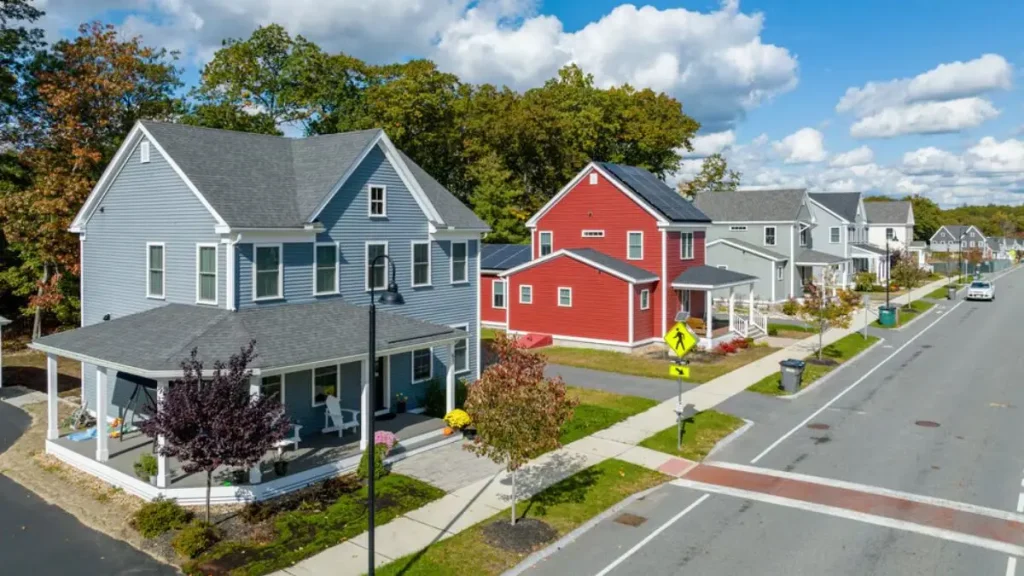Devens Housing Working Group Unveils New Strategy for Residential Development
Devens, a small but growing area in Massachusetts, is about to experience a major shift in how housing is developed. You may have heard about the proposed housing strategy that’s making waves in the local community. But what exactly does it mean for you, especially if you’re thinking about buying or renting in Massachusetts?
This new housing plan is designed to tackle two major issues: the state’s growing demand for affordable housing and the need for sustainable development. The strategy focuses on zoning changes, infrastructure upgrades, and community involvement—an approach that, if done right, could make a significant difference for everyone from local residents to developers.
Why should you care? Because the future of housing in Massachusetts is about to change—and understanding how it might affect you is key to making informed decisions in the near future. Whether you’re a potential homebuyer, a local resident, or just someone interested in Massachusetts’ growth, this new strategy could have a big impact on you.
The Current Housing Situation in Massachusetts
Massachusetts is currently experiencing a dynamic housing market, characterized by rising home values and shifting buyer behaviors. As of April 2025 report, the average home value in Massachusetts stands at $658,231, reflecting a 3.6% increase over the past year. This upward trend indicates a competitive environment for potential buyers.
In Boston, the average home value is slightly higher, at $807,967, marking a 2.9% rise year-over-year as per Zillow report. These figures suggest that both the state and its capital are witnessing significant appreciation in home values.
However, the market dynamics are also shifting. The number of homes sold has decreased by 4.1% year-over-year, while the number of homes for sale has risen by 18.9%. This increase in inventory, coupled with a slight decline in the percentage of homes selling above the list price, indicates a potential cooling of the previously heated market.
These trends highlight the evolving nature of Massachusetts’ housing market, where rising home values are met with changing buyer and seller behaviors. Understanding these dynamics is crucial for stakeholders to navigate the current real estate landscape effectively.
What is the Proposed Housing Strategy for Devens?

The proposed housing strategy for Devens is a comprehensive plan that aims to address the growing demand for housing while also enhancing the area’s infrastructure and local economy. At the heart of the plan is a shift in zoning regulations that will enable higher-density housing developments in areas previously restricted to lower-density construction.
This change is expected to pave the way for the development of hundreds of new residential units, making housing more accessible for Massachusetts residents.
According to a report from Harvard Press, this strategy will involve partnerships between local governments and developers, as well as incentives to encourage sustainable, mixed-use developments.
The zoning changes will allow for greater flexibility in how land is used, promoting the creation of affordable housing while also boosting the local economy through increased commerce and job opportunities.
In addition to zoning changes, the strategy also includes a focus on improving local infrastructure. This includes the development of new transportation options, such as bus routes and bike lanes, which will help integrate the new housing developments into the broader Massachusetts community.
Overall, the strategy aims to transform Devens into a more vibrant, sustainable, and accessible community that will benefit both new residents and current inhabitants.
The Benefits of the New Housing Strategy
The proposed housing strategy for Devens promises several key benefits for Massachusetts, addressing both housing affordability and economic growth. One of the most significant advantages is the potential increase in housing availability in a region that has been struggling with supply shortages.
By allowing for higher-density housing, this strategy could make homeownership and rental options more accessible to a wider range of people, particularly in a market where prices have been rising steadily.
Economic benefits are another major selling point. The increased housing supply will require infrastructure upgrades and create jobs in construction, transportation, and local services. As new residents move to Devens, there will also be a boost in local spending, with an increase in demand for goods and services, thus stimulating the economy.
In addition, the focus on sustainable development is a key feature of this strategy. By emphasizing green building techniques and energy-efficient designs, the housing developments will reduce the environmental impact of construction while promoting a healthier lifestyle for residents. These benefits not only help meet the housing needs of today but also ensure that the community remains vibrant and sustainable for future generations.
The increased accessibility to affordable housing could also help reduce the financial strain on lower- and middle-income families, giving them the opportunity to live in areas with strong job markets and good schools.
Do you believe this strategy will make housing more affordable? Let us know your views in the comments section!
Potential Challenges and Criticisms of the Strategy
While the proposed housing strategy for Devens has significant potential, it is not without its challenges and criticisms. As with any major development plan, there are concerns about how these changes will affect the local community, the environment, and the existing infrastructure.
One of the primary criticisms is that the proposed zoning changes could lead to overdevelopment, which might strain local resources. Some local residents and community leaders have expressed concerns that the rapid expansion of housing in Devens could lead to increased traffic congestion, overcrowded schools, and overwhelmed public services. These issues could negatively affect the quality of life for both new residents and current inhabitants.
Another potential issue is the environmental impact of new construction. While the strategy emphasizes sustainable development, building hundreds of new homes and infrastructure projects requires a significant amount of land and materials. Environmental groups have raised concerns about the long-term impact of development on local ecosystems, particularly if proper environmental safeguards are not implemented during construction.
Lastly, there is the concern of affordability. While the strategy is designed to create more housing, there is no guarantee that these new units will be affordable for all income levels. Critics argue that the market may still favor high-income buyers or renters, leaving lower-income families behind.
Despite these criticisms, the proposed housing strategy for Devens presents an opportunity for meaningful growth and development in a region that has seen a demand for more housing. Addressing these challenges will be key to ensuring that the plan achieves its intended goals without compromising the well-being of local residents or the environment.
Much like the recovery efforts in Texas after the devastating floods, as discussed in our Trump Signs Disaster Declaration After Texas Floods — Federal Aid Coming article, housing strategies often face challenges when balancing rapid development with community infrastructure needs.
How Will This Strategy Impact Massachusetts Homebuyers and Renters?

The proposed housing strategy for Devens will have direct implications for homebuyers and renters across Massachusetts. By increasing the supply of housing in the region, the strategy is designed to help alleviate some of the pressure on the housing market, which has been struggling with high demand and low inventory.
For homebuyers, this strategy could mean more affordable options, particularly for those looking to purchase in suburban areas like Devens. By focusing on high-density housing, the strategy aims to increase the availability of homes while maintaining a balance between residential and commercial spaces. This could open up new opportunities for first-time homebuyers and families who have struggled to find affordable properties in high-demand areas.
For renters, the impact could be similarly beneficial. With more housing options available, rental prices could stabilize or even decrease in the long term, providing greater affordability for individuals and families looking for places to live. The focus on mixed-use developments in Devens could also mean that renters have access to a wider range of amenities, such as shops, parks, and public transportation, making these areas more desirable and livable.
Moreover, the development of sustainable, energy-efficient housing options could reduce utility costs for renters and homeowners alike, contributing to long-term savings. By prioritizing green building practices, the strategy also addresses the growing demand for eco-friendly housing that reduces the environmental footprint.
While the full impact of the strategy won’t be realized immediately, homebuyers and renters can expect a more balanced and affordable housing market in the coming years as these developments begin to take shape. For those currently struggling with high prices or limited availability, the new housing strategy may provide some much-needed relief.
Timeline for Implementation and Expected Results
The proposed housing strategy for Devens is set to unfold in multiple phases over the coming years. According to Mass Development‘s 2023 meeting minutes, the rezoning of Vicksburg Square is currently a top priority. During a meeting of the Devens Jurisdiction Framework Committee, it was revealed that representatives from the surrounding communities expressed openness to housing development at Vicksburg Square, indicating a collaborative approach to the project.
The first phase of the project will focus on rezoning key areas to allow for high-density housing developments. This will be followed by infrastructure improvements and the construction of new housing units. While specific timelines are still being finalized, the phased approach aims to ensure sustainable growth and integration with existing community plans.
Want to stay updated on housing developments and related news? Join our community on WhatsApp for the latest updates and insights!
Conclusion
The proposed housing strategy for Devens is a bold step forward in addressing the growing demand for housing in Massachusetts. By focusing on rezoning, high-density development, and sustainable growth, the plan aims to create a balanced, thriving community that will benefit both current residents and newcomers. However, like any large-scale development, it comes with its share of challenges, particularly regarding infrastructure and environmental concerns.
As the strategy moves from planning to implementation, its success will depend on how well local communities, developers, and government officials collaborate to address concerns and maximize benefits. Ongoing public engagement, strategic zoning, and attention to sustainable design will be key to ensuring that the housing strategy fulfills its potential.
For homebuyers, renters, and developers alike, Devens offers an exciting opportunity to be part of a growing, dynamic area. By 2030, the housing developments in Devens could provide thousands of affordable homes, relieving some of the pressure on Massachusetts’ overcrowded housing market. While challenges will undoubtedly arise, the proposed strategy holds promise as a sustainable model for future housing developments in Massachusetts.
Stay updated on the latest developments in Massachusetts housing strategy by following our updates on WhatsApp. Join the conversation today!
Disclaimer: The information provided in this article is based on publicly available sources. While every effort has been made to ensure accuracy, details may change as the housing strategy for Devens progresses. Readers are encouraged to consult official resources for the latest updates.


